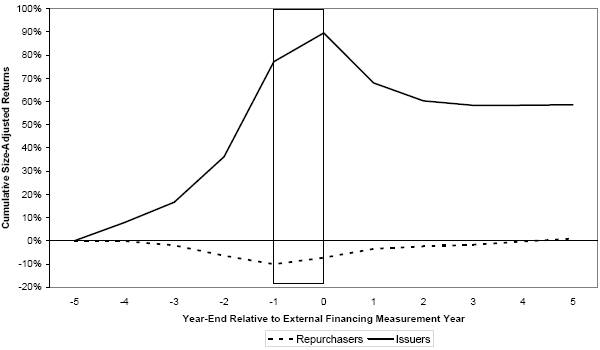The most informed investors in a firm’s stock are the executives and board members of the company. They have access to more, and more current, private information than anyone else. Do their actions in buying or selling equity or debt on behalf of the company reliably indicate its concurrent stock valuation? Do financial analysts accurately interpret these signals for investors? In the June 2005 update of their paper entitled “The Relation Between Corporate Financing Activities, Analysts’ Forecasts and Stock Returns”, Mark Bradshaw, Scott Richardson and Richard Sloan investigate the relationships among: (1) a simple cash flow-based measure of corporate financing activities; (2) analyst reactions to these activities; and, (3) stock returns. Corporate financing activities include selling and buying back of common stock, preferred stock, convertible debt, subordinated debt, notes payable, debentures and capitalized lease obligations. Using financial data spanning 1971-2000 and analyst forecast data spanning 1975-2000, they conclude that:
- There is a strong negative relationship between net external financing and future stock returns (see figure below). This relationship is stronger for total net external financing (average annual long-short investment strategy return of 15.5%) than for either net equity financing (11.2%) or net debt financing (8.1%) separately.
- There is a negative relation between net external financing and future profitability, mostly due to equity financing.
- There is a strong positive relationship between net external financing and analyst overoptimism regarding short-term earnings forecasts, long-term earnings growth forecasts, buy/sell recommendations and target prices. For debt transactions, overoptimism concentrates in short-term earnings forecasts. For equity transactions, overoptimism extends to long-term earnings growth forecasts, buy/sell recommendations and target prices.
- External financing activities dominate investment banking affiliation as a determinant of analyst overoptimism.
The following figure, taken from the paper, shows the cumulative size-adjusted stock returns for the top 10% of net equity/debt sellers (issuers) and the top 10% of net debt/equity repurchasers over an 11-year window centered on the year of financing activity (indicated by the box). It suggests that undervaluation (overvaluation) of company stock may trigger repurchasing (selling). It also suggests that net financing activities forecast a reversal of fortune; in other words, corporate executives can time the market for their stock.

In summary, firms sell (buy back) company financial assets when their stocks are overvalued (undervalued), and analysts misinterpret or underreact to these actions. Investors should focus on the actions of corporate executives and not the forecasts of analysts.